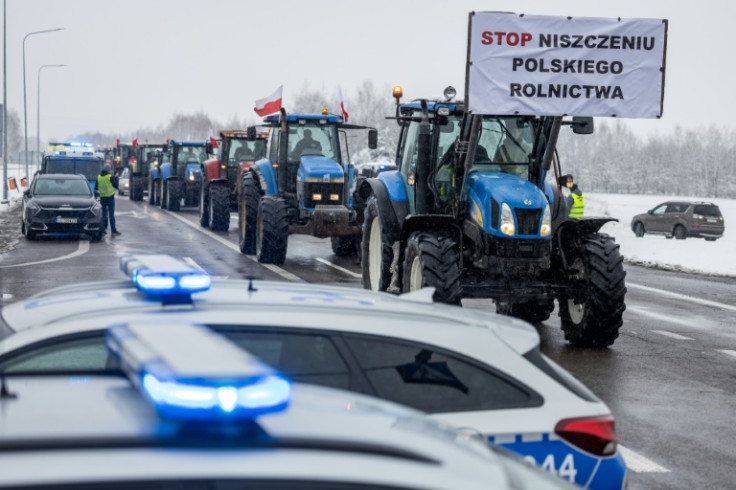Polish Farmers Protest Ukraine Imports As Govt Weighs New Bans

Polish farmers on Friday staged blockades at border checkpoints with Ukraine to protest competition from its neighbour as Warsaw hinted it could impose new import bans on Ukrainian agricultural products.
Farmers protested at over 250 locations across Poland, blocking highways and snarling traffic with columns of slow-moving tractors converging on major cities.
"We have no other choice," Marcin Wilgos, an organiser of the protest in Dorohusk at the border with Ukraine, told AFP next to a banner calling on the European Union to ban Ukrainian grain and sugar.
The protests come shortly after Polish truckers staged a two-month blockade of major border crossings to demand the reintroduction of restrictions to enter the EU for their Ukrainian competitors.
The hauliers have suspended the blockade until March but warned that they would return to the border if their demands were not met.
Poland has been among Ukraine's staunchest supporters during Russia's nearly two-year invasion, but frictions over grain import restrictions introduced by Poland and four other EU countries in June have further strained ties between the allies.
Polish Agriculture Minister Czeslaw Siekierski told state radio on Friday that "complete" bans on imports could be imposed on other groups of products as well.
"It may be needed for sugar, if the influx is too large. It may be needed for poultry," Siekierski said, adding that the government intended to raise the issue in talks with Kyiv.
Asked about the protests, Siekierski said the farmers had "legitimate expectations and demands" to limit imports from Ukraine, which farmers say are unfairly driving down prices.
Siekierski also said he planned to meet with protest organisers later Friday before hosting them at the ministry next week.
The protest, called by Poland's main farming union, is slated to continue for a month, part of growing farmer discontent across Europe over tanking prices across the continent.
Europe's farmers say the competition has battered their earnings because Ukrainian producers are not bound by EU rules such as animal welfare.
"The glut of products from Ukraine, produced not in accordance with EU standards and procedures, is a huge burden for us," Wilgos said.
The EU-approved ban on grain imports by the five countries expired in September, when the previous populist Law and Justice (PiS) party still governed Poland.
But the ban was extended and maintained even after the new pro-EU coalition government came to power after Polish elections in October.
Polish officials have nonetheless urged the resignation of EU agriculture commissioner Janusz Wojciechowski, a Polish national who gained the post with the support of the PiS.
On Friday, the powerful PiS chairman Jaroslaw Kaczynski unexpectedly joined the calls, saying he would ask Wojciechowski "to end his mission" while acknowledging that he had "no influence" on whether he would continue in the post.
© Copyright AFP {{Year}}. All rights reserved.





















